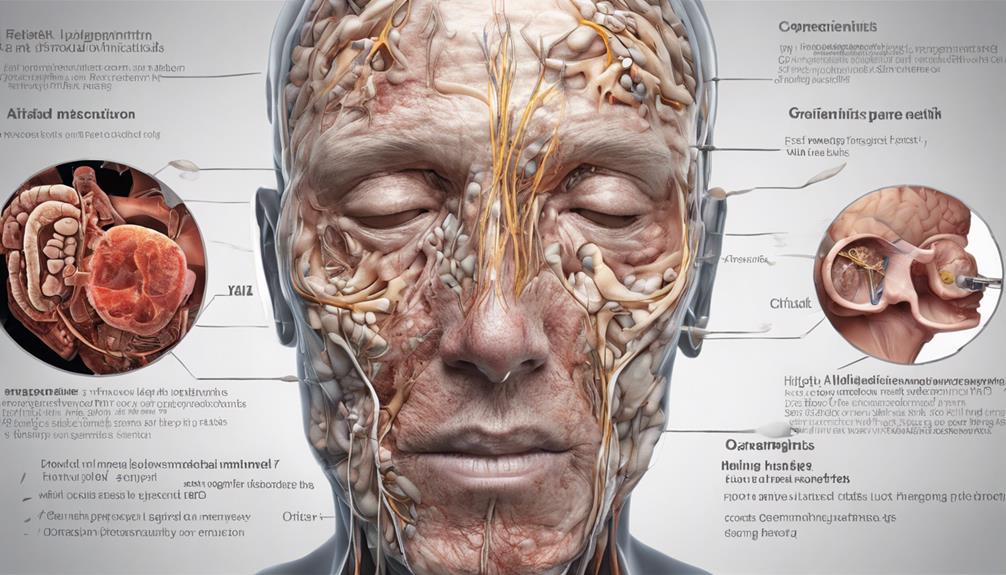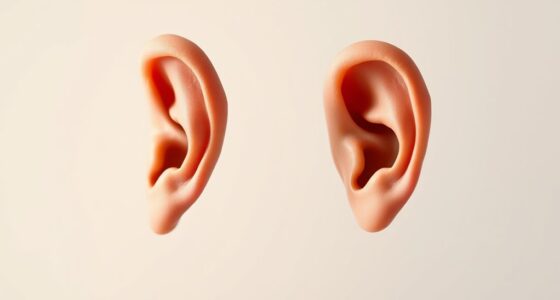As we delve into exploring the complex link between meningitis and hearing loss, the pressing question emerges: Could this inflammatory disease cause lasting damage to our hearing abilities?
The intricate workings of bacterial meningitis on our delicate auditory system beckon our attention, prompting a deeper exploration into the potential ramifications of this infection.
Stay tuned as we navigate through the complexities of this connection and shed light on the impact meningitis can have on our hearing abilities.
Key Takeaways
- Meningitis can cause sensorineural deafness by damaging the cochlea.
- Understanding mechanisms of hearing loss is crucial for early intervention.
- Regular screenings post-meningitis aid in early detection of hearing issues.
- Early identification and intervention prevent long-term consequences of hearing impairment.
Mechanisms of Meningitis-Related Hearing Loss
In cases of meningitis-related hearing loss, the primary mechanism involves cochlear injury resulting from infection or inflammation. Bacterial meningitis can lead to sensorineural deafness in children by damaging the delicate structures of the inner ear, particularly the cochlea, where sound is converted into electrical signals for the brain to interpret.
This type of hearing loss is sensorineural, affecting the auditory nerve's ability to transmit signals effectively. The inflammation and infection associated with meningitis can cause permanent damage to the cochlear hair cells and auditory nerve, leading to irreversible hearing impairment.
The cochlea's sensitivity to infection-related damage makes it a critical area of focus when considering the impact of meningitis on hearing. Therefore, understanding the intricate mechanisms underlying meningitis-related hearing loss is essential for early identification and intervention to mitigate the long-term consequences for children affected by this condition.
Risk Factors for Hearing Impairment

Identifying key risk factors for hearing impairment post-meningitis is crucial for effective intervention and management strategies. When considering the risk factors associated with hearing impairment in children who've had meningitis, several key factors come into play:
- Prolonged Hospitalization: Children who experience extended stays in the hospital due to meningitis are at a higher risk of developing hearing impairment.
- Low Glasgow Coma Scale Scores: Individuals with lower GCS scores during the acute phase of meningitis have an increased likelihood of experiencing hearing loss post-recovery.
- Cranial Nerve Palsy: Complications such as cranial nerve palsy can significantly contribute to the development of hearing impairment in children post-meningitis.
- Otoacoustic Emissions: Otoacoustic emissions serve as a valuable diagnostic tool to assess the hearing status of children after they've had meningitis.
Screening for hearing loss is recommended after meningitis, especially in children with identified risk factors, due to the high prevalence of impairment in this population. Understanding these risk factors is essential for timely intervention and appropriate management of hearing impairment in children who've had meningitis.
Importance of Early Detection
Detecting hearing loss early post-meningitis is critical for timely intervention and effective management. Patients with bacterial meningitis are particularly at risk of developing profound hearing loss, making early detection crucial. Regular hearing tests, ideally within four weeks of recovery, are essential to identify any auditory issues promptly. Early detection not only allows for prompt intervention but can also prevent long-term consequences such as social and educational impairments, especially in children.
Otoacoustic emissions serve as a valuable tool in screening for subtle changes in hearing function, aiding in the early identification of issues. By intervening promptly after detecting hearing loss, healthcare providers can significantly improve outcomes and enhance the quality of life for individuals affected by meningitis-related auditory complications. Therefore, incorporating routine hearing screenings into post-meningitis care can play a vital role in the effective management of auditory issues and overall patient well-being.
Hearing Screening Recommendations

Conducting timely hearing screenings post-meningitis is crucial for identifying potential auditory complications and facilitating prompt intervention. Here are some key recommendations regarding hearing screenings post-meningitis:
- Children's Hearing Test: Children under 16 who've had bacterial meningitis should undergo a hearing test within four weeks of recovery to assess cochlear function and potential sensorineural hearing loss.
- Adult Screening: Individuals over 16 concerned about hearing loss post-meningitis should seek a hearing test from their GP to monitor any auditory changes.
- Hearing Loss Incidence: Sensorineural hearing loss rates post-meningitis can vary from 5% to 35%, emphasizing the importance of regular screenings.
- Risk Factors: Complications such as prolonged hospital stays and low Glasgow Coma Scale are associated with an increased risk of hearing loss in children post-meningitis, highlighting the need for vigilant monitoring and early intervention to address any auditory deficits promptly.
Support for Individuals With Meningitis-Induced Hearing Loss
After addressing the importance of timely hearing screenings post-meningitis, it's crucial to explore the various support options available for individuals coping with meningitis-induced hearing loss.
The National Deaf Children's Society provides global support for children affected by hearing loss due to meningitis, offering a range of resources and assistance.
Auditory Verbal UK specializes in teaching deaf children to listen and speak following meningitis, aiding in their communication development.
For infants and pre-schoolers impacted by hearing loss from meningitis, the Elizabeth Foundation offers valuable support services.
Additionally, Hearing Link offers information and support not only for individuals with meningitis-induced hearing loss but also for their families, helping them navigate the challenges associated with this condition.
Those seeking immediate assistance can contact the nurse-led helpline at 0808 80 10 388 or email helpline@meningitisnow.org for personalized support and guidance on managing hearing loss post-meningitis.
Frequently Asked Questions
What Are the Psychological Effects of Meningitis?
The psychological effects of meningitis can be profound, impacting children's mental health. Anxiety, depression, and behavioral changes are common post-meningitis. Emotional distress, fear of recurrence, and adjustment issues may also arise.
Older children may struggle with hearing loss post-meningitis, affecting self-esteem and social interactions. Psychological support, counseling, and open communication are crucial for helping children cope. Schools and healthcare providers must provide resources and support for children dealing with these effects.
What Are the Behavioural Changes After Meningitis?
After meningitis, we may notice behavioral changes in children. These can include increased irritability, mood swings, or social withdrawal. Such alterations may stem from the impact of the illness on their emotional well-being.
It's crucial to recognize and support these adjustments as part of the recovery process. By providing understanding and patience, we can help children navigate these post-meningitis changes effectively.
How Does Meningitis Affect You Later in Life?
Meningitis can have lasting effects on individuals later in life. These effects can include long-term hearing loss, particularly if the inner ear or auditory nerve is impacted during the infection. Sensorineural deafness, caused by cochlear damage from meningitis, is often permanent. Balance issues and tinnitus may also persist, affecting quality of life.
Regular hearing tests post-meningitis are crucial for monitoring changes. Emotional support and adaptation are vital for those dealing with hearing loss and other lingering effects.
What Are the Symptoms of Meningitis Brain Damage?
When discussing the symptoms of meningitis brain damage, it's crucial to recognize the diverse range of challenges individuals might face. These can include hearing loss, balance issues, and tinnitus.
The repercussions of this condition can extend beyond mere physical discomfort, impacting daily activities and quality of life.
Understanding these manifestations is vital in providing comprehensive care and support for those affected by meningitis-related brain damage.
Conclusion
In conclusion, the connection between meningitis and hearing loss is clear, with bacterial meningitis posing a significant risk to auditory health. Understanding the mechanisms and risk factors associated with this condition is crucial for early detection and intervention.
As we continue to explore ways to support individuals with meningitis-induced hearing loss, one question lingers: how can we improve awareness and access to hearing screenings for those at risk?










